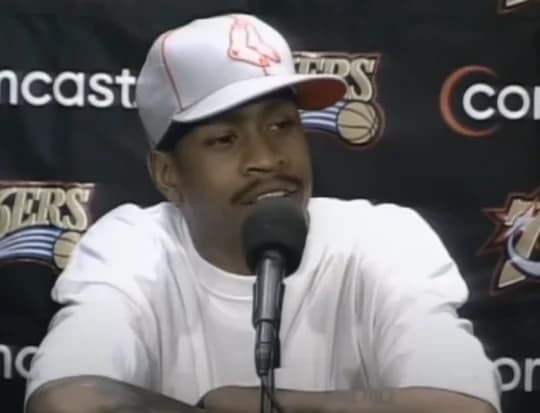Allen Iverson Breaks Silence: “I’m a Better Man Than Your Pastor,” NBA Legend Defies Stereotypes!

In a revelatory interview on “The Starting Five” podcast, NBA icon Allen Iverson boldly challenges societal perceptions, delving into his past, present, and unfiltered opinions on image, character, and personal growth.
Allen Iverson’s recent podcast appearance provides a rare glimpse into the mind of a man who defied norms throughout his illustrious career. His candor invites reflection on societal judgments and prompts crucial conversations about the intersection of appearance, character, and true virtue.
Iverson’s assertion that “these n****s are straight killers” challenges deeply ingrained stereotypes about appearance and criminality. By referencing notorious figures like Al Capone and John Gotti, he compels society to reevaluate preconceived notions. Iverson’s defiance of conventional standards is a testament to his enduring impact, both on and off the court.
Allen Iverson’s life story is one of resilience, defiance, and redemption. From a turbulent adolescence, including a bowling alley altercation that led to arrest, to his transformative stint at Georgetown University, Iverson has weathered storms that could have defined him. Instead, he emerged as one of the most influential figures in basketball history.
Iverson’s journey took a pivotal turn at Georgetown University, where he not only showcased his basketball prowess but also earned accolades such as the Big East Rookie of the Year and Defensive Player of the Year. His trajectory from a troubled past to college stardom laid the foundation for an exceptional NBA career.
Wearing the iconic No. 3 jersey, Iverson’s 12-season tenure with the Philadelphia 76ers solidified his status as a basketball legend. Three All-NBA First Team recognitions, four NBA scoring championships, and a reputation for tenacious defense marked his on-court brilliance.
Iverson’s journey reached its pinnacle with his induction into the Naismith Memorial Hall of Fame in 2016, alongside fellow icons Shaquille O’Neal and Yao Ming. The recognition was not just for his statistical achievements but for the indomitable spirit that defined his career.
In 2021, Iverson’s enduring impact on the NBA was further celebrated as he joined the prestigious NBA’s 75th Anniversary Team. His No. 3 jersey, forever associated with the grit and grace of “The Answer,” was rightfully retired by the Philadelphia 76ers.
Allen Iverson assertion that he is a better man than a conventional pastor sparks contemplation on societal expectations and judgments. His declaration challenges the notion that appearances define virtue, emphasizing the significance of love, actions, and personal growth.
While Iverson’s statements may be provocative, they open a dialogue about the complexities of character and the unfair scrutiny faced by public figures. His unapologetic stance invites society to reassess ingrained biases and appreciate the multifaceted nature of individuals beyond societal expectations.
In an era of increasing social awareness, Allen Iverson Iverson’s bold commentary adds another layer to ongoing conversations about image, stereotypes, and authenticity. As society grapples with evolving norms, Iverson’s narrative serves as a reminder that personal growth and genuine character transcend superficial judgments, urging us all to look beyond appearances and embrace the essence of the human spirit.





